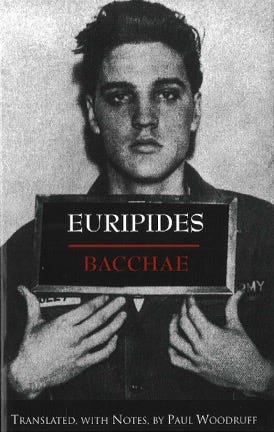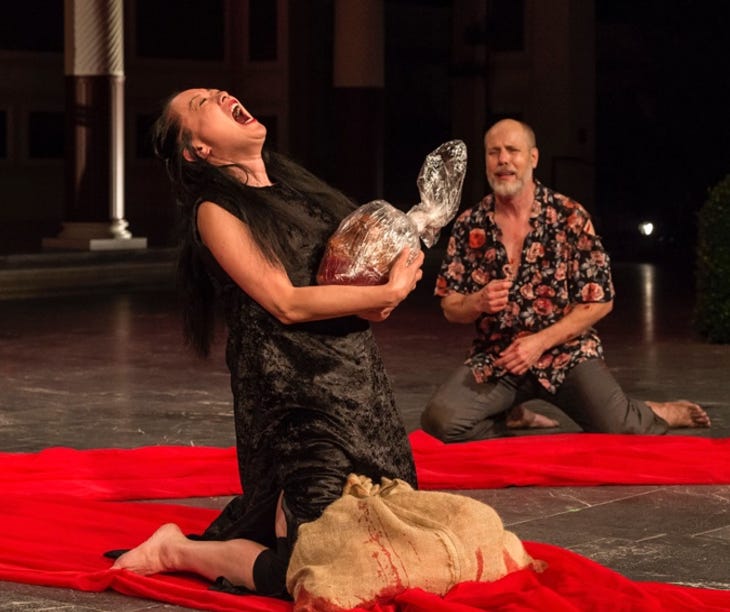Improv’s Paradoxes
The Trick of Trickster
What we have to do now is make clear we do want government to work differently and better than it has, but burning it to the ground won’t do that for anyone.
– Pete Buttigieg
The Trickster archetype is full of delicious paradoxes and contradictions—delicious to those like me who revel in life’s complexity. Lord of the marketplace, Trickster has an ear for both merchants and for thieves. Lord of Liars, he also makes communication possible—between gods and humankind by creating the rituals of sacrifice, and among us, inspiring hermeneutics, the science of interpretation. The god of mischief, Trickster often makes things better, ends up enriching culture. The disruptive voice of improvisation, Trickster challenges decorum, the right way to do things. Amoral, not immoral, neither good nor evil, from Trickster’s mischief the values we live by emerge. From Trickster’s pot stirring, more delicious gumbos flow. Trickster embodies the paradoxes of human existence, including the ultimate paradox: the idea that duality, symbolized by the two snakes on his caduceus, can be unified. (The more familiar medical staff only has one).
Like Trickster, improv too, is laced with paradoxes and contradictions. Improv is all about freedom, choosing the pathway forward at will. Yet, for the paradox master Oscar Wilde, “spontaneity is a meticulously prepared art.” So too, though well masked behind its ease improv is dependent on years of practice. In the Renaissance, to show their smarts courtiers cultivated sprezzatura, what Baldassare Castiglione defines as “a certain nonchalance, so as to conceal all art and make whatever one does or says appear to be without effort and almost without any thought about it” (The Book of the Courtier, 1528).
Improv simultaneously invokes man’s free will and longs for its opposite, man’s dependence on powerful, external forces: inspiration. As Harvard scholar Stephen Greenblatt points out, “we cannot locate a point of pure premeditation or pure randomness.”
Perhaps improv’s greatest paradox is that, posing as something just for fun—we’re just noodling here—improv does have purpose. Its central trope—creating in the moment of presentation—seeks to persuade us that our rational faculties need to take a back seat to our instinctual and intuitive lives. I did this without thinking, so trust me, they say time and again, dazzling us with their adlibs (if meticulously). The trope masks the hard work behind their spontaneous exertions. Soon reason and logic, evidence-based science, and the norms of civic and political life are not just in the back seat but in the ditch.
At bottom, improvisation is both light and dark, creative and destructive, a power and a peril. Improv is the engine of both democracy and demagogy.
Improv is all about freedom. But as we're seeing in America today, improv can shut freedom down. In the hands of a treacherous Trickster, an autocrat, improv’s power is impossible to defeat. Faced with any number of ways forward, the improviser, ever quick as winged Hermes, can choose the least defended.
When Musk and his minions flood the zone, defense is futile. Throwing not just one strand of spaghetti against the wall but the whole pot, Trump defies us to choose the one strand too al dente, certain to break a tooth, throw the whole dish off, or cause havoc rather than better government. Of course they're all uncooked, what Steve Bannon calls “freak experiments” prepared by Musk’s nameless 20-year-old sous-chef-coders who steal our Social Security numbers, our medical and financial records. Uncooked, their invasive, unchecked, and illegal recoding of consequential government data files may do untold harm. For Steve Bannon, “The way to deal with [the opposition] is to flood the zone with shit.” Bannon adds: “This is not about persuasion. This is about disorientation.” All in the name of freedom and the unitary presidency, which paradoxically is to say, all in the name of control from the top. Again Bannon: “Musk is parasitic illegal immigrant.” Al dente? We may soon all be toothless.
When there is a whole potful of these nerds (or shit), where to start?
It’s all a dodge, a sleight of hand. As Rahm Emmanuel put it on Kara Swisher’s podcast On, “We can talk about the price of Greenland, or we can talk about the price of groceries.”
Trickster is lord of the crossroads, he always finds a way. But what do you do when “a fork in the road” fires tens of thousands of civil servants who have long done the work of good government? Who is left to send us our social security checks or audit the tax returns of billionaires?
Who is left to govern?
The king and his minions are left.
And democracy crumbles.
The Trick of Trickster
What makes Trickster so tricky is that he is almost always a source of fun and games. We trust him. Hermes was “the friendliest god.” But improv has a dark side, and Hermes has a dark cousin: Dionysus.
Dionysus, Hermes’s more extreme Trickster cousin, energizes Trump. Dionysus is a nature god, the oldest extant symbol in western culture, symbolized by the grape cultivation and wine fabrication he instilled. Dionysian intoxication represents transformation and rebirth, a challenge to hyperrationality. He is an outsider, known as “the god who comes.” His coming is always an epiphany, always presenting himself in his charismatic state. He is “Bromios,” the loud-roarer. But, promising innovation fueled by intoxication, all he brings is chaos. Hermes responds to Apollo’s anger in The Homeric Hymn with an innocuous fart. In Euripides’s The Bacchae he incites regicide, his own little January 6.
A delicious paradox: a teetotaling president seized by the archetype of Dionysus.
Dionysus has an attractive side. Want to get drunk? Dionysus, the god of wine, is your guy. But once you're intoxicated, he demands utter loyalty. In Euripides’s The Bacchae Dionysus delivers to his followers, the Bacchae, the transformation loyalty (and wine) promise. Intoxication brings unmediated experience of his godhead—radiance—what improvisation has always promised. His drunken Bacchae “see me clearly as divine”—his insistent demand. But compared to Hermes’s baby poot, Dionysus’s demand of loyalty wreaks total chaos. No authority is left standing but him.
Demanding loyalty rather than inspiring freedom, Dionysus is what Tim Snyder calls “the weak strongman, a strongman in the sense that he makes others weak.”
It's not a pretty story. Pentheus, the hyperrational king of Thebes refuses to believe Dionysus’s divinity. His daughter Agavê is a believer. She joins the Bacchae in their drunken festivities outside the walls of Thebes. When Pentheus in disguise is caught by the Bacchae, Agavê beheads her dad and eats his raw flesh. Kingless, Thebes is left in the hands of Dionysus, who seems less interested in governance than blind loyalty.
Sound familiar? Dionysian Trump commits not regicide but democracide. He is that “rough beast” of Yeats’s nightmare, that “Slouches towards Bethlehem to be born.” His manger no doubt will be in Gaza’s Mar-a-Lago East. The three kings? Why, Musk, Zuck, and Putin of course.
Musk, Zuck, and Putin, oh my… has a nice ring, doesn’t it? And we’re off to the Emerald City…
Here’s what worries me in this Trump-as-Dionysian-Trickster narrative. Granted this archetype stuff seems a little fuzzy headed. What’s it have to do with everyday life? you might rightly wonder. But you avidly stream the Star Wars series or the Marvel Cinematic Universe, or Hollywood movies, 80% of which get their power from the “hero’s journey,” right out of Joseph Campbell or the father of archetypal psychology, Carl Jung. These archetypal figures and narratives have the power to keep us watching because they live deep within us. For Jung, “Everyone carries a shadow, and the less it is embodied in the individual's conscious life, the blacker and denser it is.” Dionysus, loud, charismatic, and determined—black and dense—is friendly Trickster’s shadow.
Who do you know less conscious and more driven by their subconscious? If this torrent of antidemocratic actions by a democratically elected president seems like a fever dream, it's because we are living within a Trumpian nightmare.
What would Jung and Campbell recommend? We must embrace the Trickster in us. We must embrace our shadow, make it conscious. It’s time for the Resistance to found an Act Up-like project as AIDS activists did in the 80s. It’s time to throw paint on the Constitution as climate activists have done. It’s time to fart in the face of those who would throw a wrench in the spokes of our experiment in democracy.
In an Attention Economy, we are dutybound to call attention in the most outrageous, indecorous fashion to the outrageous, indecorous kakocracy now at the helm of state.
A WWA match Trickster vs. Trickster: that is the paradox we must embrace.
Liked this post? I’d be grateful if you’d give the ❤️ button a tap, or leave a comment below! It helps keep me going to know you appreciate my writing.







"Chaos is a ladder; climb it." ~ Amanda Litman
There are so many different ways to practice political improv. Here are two examples of Resistance Tricksters who are consistently Acting Up.
The Big Easy's very own, Tim Miller, recently interviewed Amanda Litman on his Bulwark podcast. Amanda is the co-founder and executive director of Run for Something, a PAC that helps recruit and support young, diverse progressives running for down-ballot office. She's the author of Run for Something: A Real-Talk Guide to Fixing the System Yourself (2017).
At 6:30 in this video, Amanda says:
"I think we've still got a wide open field for people to step up. Chaos is a ladder; climb it."
Tim and Amanda then discuss the political nuts & bolts and electioneering mechanics of what makes wave elections happen, citing concrete examples of past successes --- not only at the Congressional level, but --- down ballot. More importantly, they address how people can prepare mentally & practically right now to win big in 2026.
https://youtu.be/4gfpflLP0tg
Stephen Pavey of Hope in Focus is an artist, a witness, a photographer, a contemplative activist – all of which come together in the vocation of cultivating a way to see, in order to bear witness to the world both as it is, and as it could be.
Stephen offers inspiration from the Prophet Amos, who begins a lament, or cry of sorrow, against a way of life that's reminiscent of the times we are presently living through: “There will be wailing in all the streets” (5:16).
Stephen tells of how, in our own day, the prophet Callie Greer, who lives in Selma, Alabama, and organizes with the Poor People’s Campaign, tells the nation, “You must let me wail.”
Stephen writes: "In February 2020, she testified to her pain and oppression at a public gathering in Selma: years earlier, her daughter had died in her arms due to poverty and lack of health care. Callie cried out, 'You must let me wail for the children I’ve lost to poverty and will never get back, wail for all the children we mothers have lost. I won’t waste my pain. I hope I make you feel uncomfortable. I hope I make you feel angry. I’m wailing because my babies are no more.' ”
https://www.stevepavey.com/p/bio
Oh, dear, I have so much to say to you! I am enamored of your premises, first of all. Improv is your Muse, yes. Oh, hell's bells you write so damn well, Randy!
Improv... I'm pretty sure you know a so fine book called "Free Play" written by my old friend Steve Nachmanovitch.
"Lila", the Sanskrit art of improvisation that keeps our world, our multiverse, in motio... for Dionysis, for Hermes, for Apollo driving his chariot across the sky.
And Trickster, oh, so much to say, say!
Ayah! I have to go do stuff....
I greatly appreciate you. I am currently an 81 year elder in Canada, Toronto. I have improvised with some of the greatest in a kind of amazing theatre jourmey.
I offer you one more quote about improv:
"There is a moment, before which it is too soon,
and after which it is too late" __Joseph Chaikin
With respect, Michele George